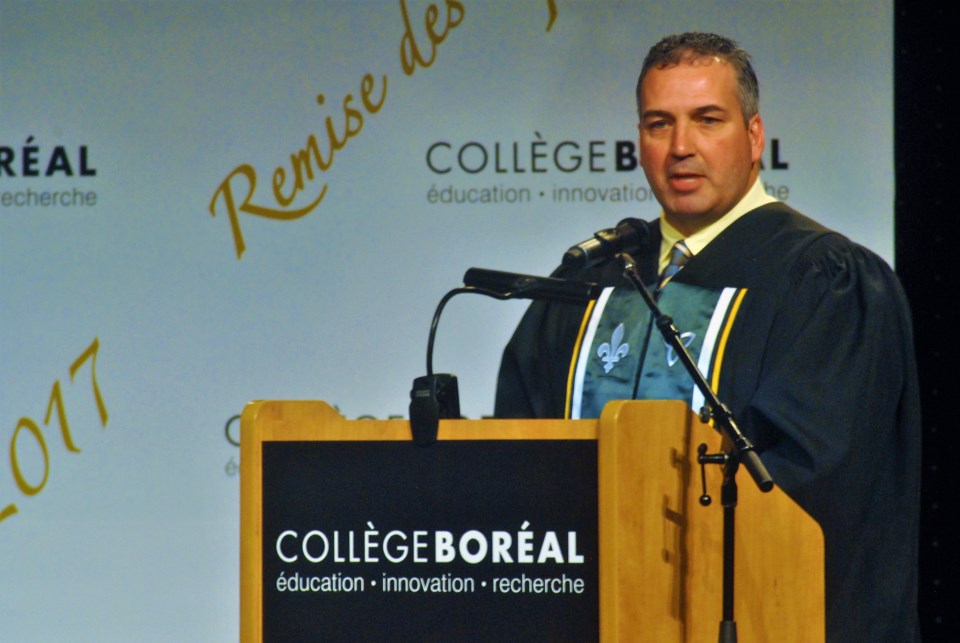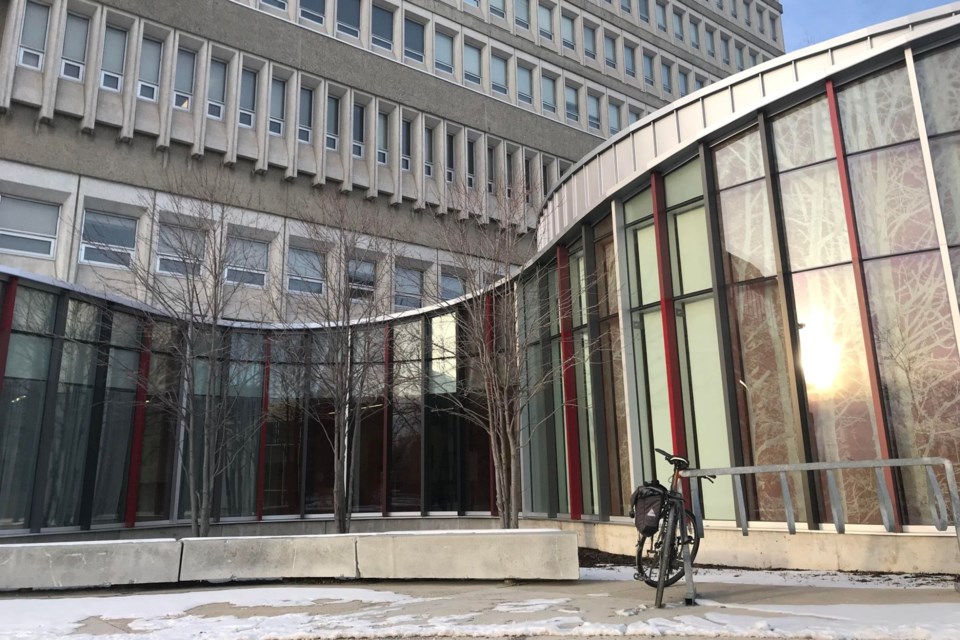The good news is that the blue-ribbon on post-secondary education in Ontario has recognized that Northern Ontario institutions — as well as those serving Francophone and Indigenous students — require special support.
The bad news is that the government has not provided any indication as to when the panel’s recommendations will actually be implemented.
Laurentian University president Sheila Embleton made these comments during the Nov. 21 LU senate meeting in the wake of the report’s release earlier this month.

“One of the good things in the report is that they do explicitly mention the institutions which serve the north, those providing French or bilingual education, those that serve a larger proportion than others of Indigenous students,” she said.
“Those that are small do tend to inevitably have higher running costs. So at least that's been recognized. Whether this translates into anything of any significance, I guess we'll wait to see.”
The panel, created in response to Laurentian University’s 2021-22 insolvency, recommended a one-time tuition fee increase of five per cent effective next September, followed by tuition fee increases of two per cent or the rate of inflation, whichever is greater.
With the tuition fee increase “there would be a continued expectation that universities and colleges make their contribution to access through both increases in institutional student assistance and more efficient operations.”
It also recommended a one-time "significant" adjustment in per-student funding due to skyrocketing inflation over the past few years. It additionally recommended a government commitment to "more modest annual adjustments over the next three to five years."
The report calls for more flexibility for enrolment-based funding for Northern Ontario institutions, as well as special grants. It also recommends ways in which Francophone institutions could work together.
Ontario’s colleges and universities are calling on the government to immediately implement the report’s recommendations, while the Canadian Federation of Students said it is “outraged” by the call for tuition fee increases.
‘It appears like a kind of stalling tactic to miss this year's budget cycle’
Embleton said the panel’s recommendations are simply that, recommendations to government, and she said the province’s response to date is not encouraging.
Colleges and Universities Minister Jill Dunlop said in a press release that the government is “carefully reviewing” the panel’s recommendations.
“It’s my expectation that we will work with post-secondary institutions to create greater efficiencies in operations, program offerings and sustainability of the sector,” Dunlop said.
Embleton said Dunlop’s focus on efficiencies is “quite alarming, because I think we've all demonstrated how efficient we have become, how pared down to the bone, no real sense of fat.
“But also it appears like a kind of stalling tactic to miss this year's budget cycle, that we won't get any increases whether through the government grants or whether through any potential rise in fees.”
She said the university sector as a whole has reacted with “some alarm” to Dunlop’s response, as “there are a lot of universities which are in a fairly precarious budgetary state. I’m thankful to report that one of them this time is not us.”
Tuition fee reduction, freeze had ‘huge effect’
The report by the blue-ribbon panel explains that in 2017, direct provincial funding to support domestic enrolment at colleges and universities was effectively frozen.
Two years later, the finances of Ontario’s colleges and universities were further challenged by the province’s decision to reduce by 10 per cent the tuition rates paid by students at these institutions, subsequent to which tuition rates were frozen.
This freeze is still in effect, and the province has announced it will continue for the 2023-2024 academic year, which began in September.

“It's had a huge effect on the college system, that's for sure,” said Collège Boréal president Daniel Giroux, in a recent interview with Sudbury.com on the blue-ribbon panel report.
He’s also glad to see the panel said grants should be increased. Per student government grants for Ontario college is 44 per cent of the national average. That figure is 57 per cent for Ontario universities.
The panel's recommendations are “encouraging,” said the Francophone college president, although it won’t bring Ontario post-secondary schools “where we should have been.”
“I think, overall, it's good news for the panel to have recognized the importance of domestic enrolment and the funding for the college system,” Giroux said.
Asked what he says to students who may be concerned about impending tuition fee increases, Giroux said Canadian students at Boréal pay an average of $2,700 per year, one of the lowest fees in the country.
He said in his 27 years at the college, he doesn’t remember receiving a complaint from a Canadian student about tuition. “We have so many opportunities to help students fund their education, it's never been brought up,” he said.
“It's a very minimal increase, but it helps the college system and the quality of the program so much that the return on investment for the student is great.”
Like Embleton, Giroux said he’s pleased the blue-ribbon panel recognized Northern Ontario institutions require special consideration. “The realities of Northern Ontario are different than the realities of the GTA,” he said.
The blue-ribbon panel report also has some recommendations regarding French-language post-secondary education.
It recommends that Collège Boréal and Collège La Cité, another French-language college, possibly partner with two under-performing French-language universities, Université de l’Ontario français and Université de Hearst.
Another possibility would be “the establishment of an integrated network or consortium for collaboration across Francophone and bilingual postsecondary institutions.”
Giroux said such collaborations would be “very well welcomed.”
In terms of Dunlop’s non-committal response to the report to date, Giroux said Ontario’s college sector has “already started meeting with the ministry and looking at action items and how we can move things forward.”
Ontario university students ‘already doing their share’
Laurentian University Faculty Union (LUFA) president Fabrice Colin said he’s in favour of more government funding for universities, but said students are already doing their part in terms of tuition.
The report said Ontario undergraduate tuition rates are already higher than in most other provinces in Canada. “So they're already doing their share,” Colin said.
But “I think there's something they didn't explore,” he said. “It's about efficiency, transparency and accountability, making sure, for instance, that there's no overspending on capital projects. Because what happened at Laurentian University I'm sure is happening also elsewhere.”
Following the release of the report from the blue-ribbon panel, Sudbury.com asked a number of institutions and organizations for interviews on the topic.
Although Embleton later provided fairly extensive comments at the Laurentian senate meeting, an interview with her on the report’s contents was not granted, and a short written statement instead provided.
"We are grateful for the work of the members of the Blue Ribbon Panel and will take time to reflect on the recommendations,” she said, in part, in her written statement.
“We are heartened that the Panel recognized the multiple factors that play a part in funding specifically here at Laurentian University.”
We also reached out to Cambrian College president Kristine Morrissey. Following this article's publication, she issued a written statement.
"I want to thank the Government of Ontario for creating the Blue Ribbon Panel to investigate the financial health of the province’s colleges and universities," reads her statement, in part. "While the Panel’s focus was on the sustainability of the post-secondary sector, its work has significant implications for many sectors across the province."
They include an increase in government base operating funding for colleges, closing the gap between per student funding for college students versus university students, providing the same per-student funding for part-time college students versus full-time students, lifting the enrolment cap for high-demand programs, and lifting the current tuition freeze with a modest increase in tuition.
"We also agree with the government’s suggestion that any increase in operational funding or student tuition be accompanied by a comprehensive review to ensure colleges are operating as efficiently as possible," said the statement.
Morrissey's statement said Cambrian, along with Ontario's other public colleges, have identified several key recommendations as priorities.
Sudbury.com also reached out to Université de Sudbury president Serge Miville about the blue-ribbon panel’s recommendations, given the yet-to-be-realized U of S Francophone university project was not discussed in the report.
The report did mention the Université de Sudbury once, as an institution that provided input.
An interview with Miville was not granted, with a spokesperson for U of S replying to our query with a statement: “The Université de Sudbury is presently studying the expert committee’s report in order to evaluate the presented options.”
-With files from Canadian Press
Heidi Ulrichsen is Sudbury.com’s assistant editor. She also covers education and the arts scene.
